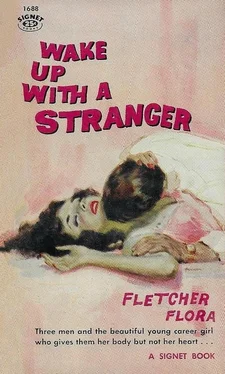“No. With no one.”
“Truly?”
“Of course. Do you think I spend all my nights with different men in turn?”
“I’m sorry. I didn’t mean that.”
“I didn’t think you did, really.”
“May I stay, then?”
“All right.”
“Promise?”
“Yes, I promise.”
They lay quietly for several minutes, not talking, and then she sat up and swung her legs over the side of the bed. “Do you want a cigarette now?” she said. “No, thank you.”
“I believe I’ll have one.”
She stood up and walked across the room in darkness to the table where she had left her case and matches. Lighting a cigarette, she stood and smoked it slowly with her back to the bed, and she could hear behind her no slightest sound.
The trouble is, she thought, I could never be strong enough. I am strong enough for one, but not for two, and after tonight — or tomorrow night, since I promised — I had better send him away for good, before worse is made of what is already bad enough.
She had planned to go on Sunday to see her mother, but she changed her mind and did not go, and she did not go the following Sunday, either. She tried to convince herself that she did not go because of other things which needed doing, and she actually worked hard at the shop on both days, but she knew quite well, nevertheless, that she did not go simply because she dreaded the visits so much. The third Sunday after her last trip to the high, narrow house on the mean street, she understood that it would be impossible to procrastinate any longer. It had now become imperative to go for the sake of her own peace, if nothing else, and so she took a taxi and got there about three o’clock in the afternoon.
Her father was in the living room. He did not rise from his chair when she entered, and apparently, since there was neither a book nor a newspaper in his hands or near him, he had simply been sitting alone and doing nothing. She was thankful that he remained still and made no effort to greet her physically, for she could not bear to have him touch her. His gray, curly hair was uncombed, and his face below it, still rather handsome in a heavy, florid fashion, had a kind of blurred look, the features somehow indistinct, as if he had been drinking heavily. She knew, however, that he had not, for he never drank at all. Neither did he smoke or gamble or engage in infidelity. His only vices were failure and petulance and sometimes petty sadism. Looking at him, she wished that she might never have to look at him again, but she was determined to be amicable.
“Well,” he said, “so you have finally condescended to come and see us.”
“I have come to see Mother,” she said, violating her amity at once with the pointed exclusion. “Is she here?”
“She’s upstairs in bed.”
“Taking a nap?”
“I don’t know if she’s asleep or not. She’s sick.”
“Sick? What’s the matter with her?”
“I don’t know. We haven’t had a doctor.”
“Has she been sick long?”
“Why should you be so concerned? If you came to see her a little more often, or if you lived at home as a decent daughter should, you would not have to ask such questions. What if she had died any time in the past three weeks? Would you want to know how long she had been dead?”
She turned away from him and started toward the door, but when she reached it, she stopped and turned and looked at him with loathing.
“I’ll tell you something,” she said, “which you know is perfectly true, though you would never admit it. I came here determined to be amicable, but I see that it is impossible, and so I will tell you what we both know. You have done a great deal for Mother, and I have done very little, this is true. But the little I have done has been for good, and the great deal that you have done has been for bad, all for bad. It would have been better if you had gone away and left her long ago.”
With an intensification of her loathing, she watched a dull and ugly flush rise slowly into his face. Before he could speak, she went on out into the hall and upstairs to her mother’s room. The room was closed tightly and did not look clean. The air was still and sour. On the bed, her mother lay breathing with a harsh, throaty sound, almost as if she were fighting strangulation, and every few seconds the strangled sound of breathing was punctuated by a moan. Crossing to the bed, Donna looked down at the sick woman and saw immediately that she was certainly burning with a high fever. That her illness was serious, if not critical, was obvious. “Mother,” Donna said.
She laid a hand on her mother’s forehead and repeated the word, and her mother’s eyes opened slowly and focused slowly.
“Donna,” she said.
She was almost unable to say it at all. The name was hardly more than the shape of the sound with her lips. She lifted a hand above the covers, and Donna caught it as it was falling.
“I’m sick,” she said. “I’m so very sick.”
Donna had to lean far down in order to hear the words. Besides being faint, they were distorted by pain.
“How do you feel?” Donna said. “In what way do you feel sick?”
“I am cold and hot by turns, and I am sick to my stomach. And my legs and back hurt. I can’t understand why my legs and back hurt me so much.”
“Why didn’t you call me?”
“I didn’t want to bother you. I was sure I would begin to feel better soon.”
“You should have called me. Surely you know that I want you to call me when you need me. Certainly, at any rate, you should have called a doctor.”
“Doctors are expensive. I thought I would get better without it.”
“Why didn’t Father call one? Damn it to hell, doesn’t he have any judgment whatever?”
“You mustn’t blame your father, dear. Things are so difficult for him just now.”
“Oh, hell! Things are always so difficult for Father. Well, never mind. I’m sorry. You lie still, now, and I’ll go call a doctor at once. Would you like the window opened a little before I go? The air is so stale in here.”
“If you think so, dear. Only a little, though. I have such chills.”
Donna released her mother’s hand and crossed to a window, which she lowered about a foot from the top, and then went out and downstairs to the telephone in the hall. She looked up the number of a doctor who had been called to the house before and dialed it with a kind of restrained violence. She was furious with her father for not having called earlier, and the fury was at the same time a useful defense against the guilt she felt herself for having stayed away so long. The doctor agreed to come, and she hung up the telephone and turned to face her father, who had come out of the living room.
“What have you done?” he said.
“I have done what you should have done yourself,” she said. “I have called a doctor.”
“We don’t need you to run our affairs. Your interference is not wanted.”
“You would let Mother die without attention, but I will not. I have called a doctor, whose bill I will pay, if that concerns you, and you can go to hell.”
“I will not allow you to talk to me like this in my own home. You are not welcome here any longer. Get out of here and don’t come back.”
“I’ll leave your Goddamn house, all right, if that’s what you want, but I’ll not leave until I’ve seen the doctor. In the meanwhile, you stay the hell away from me and leave me strictly alone. Do you hear?”
She was certain for a moment that he was going to strike her, something he had not done since that night on the porch when she was fifteen years old, but then he turned abruptly and went back into the living room. She stood and listened while he crossed to his chair and dropped heavily into it, after which she ascended the stairs and entered her mother’s room, stopping by the door and staring across at the figure on the bed, which did not move. The sick woman had not gone to sleep, but at least she had become quiet, and it would surely be better not to disturb her until the doctor came. In the meanwhile, it would be quite impossible merely to stand and wait in the shabby, sour room. What was needed was a cigarette, which would be in a measure sustaining and would make time endurable, but it might not be wise to add smoke to the already fetid air in which a sick woman already breathed with a strangled sound.
Читать дальше












